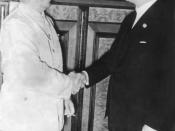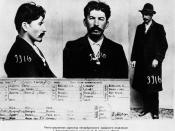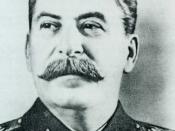A Famous proverbial saying states, "Virtue subdues power."
If the general public were given the power of managing the elaboration of society, there is no promise that the public would be capable to manage that responsibility, or manage that responsibility well. Hence, people should not take more responsibility for solving problems that affect their communities or the nation in general, but rather leave this responsibility in the qualified hands of their government.
In George Orwell's Animal Farm, the general public (the animals) rebel against an oppressive leader (the human owner of the farm), under the amateur guidance of an old boar named Old Major. The general public took responsibility for solving problems that affected their community, and initially the results were favorable to everyone within the society. But eventually, one animal within those animals rose to power. Napoleon the pig, a dictatorial leader established himself in the role of the same tyrannical leader, whom all the animals had formerly merged to force out.
In the end, the animals taking more responsibility for solving problems, rather than the government doing so, concluded in a cruel circle, with a tyrannical leader once again. If the government was to hand over the responsibility of the development of society to the people, then who is to say that a person within the general public will not rise and establish himself as the dictator? Although it is true that the people within a society can progress their own neighborhood in an enhanced scheme than the government can, due to the immense population of the nation, one must also take note of the dispute that the people can only solve problems that affect their communities and improve their society to a certain extent, due to the fact that they lack the necessary skills and resources.
Still, some might argue that the animals united not for the good and improvement of the society, but in order to remove a tyrannical leader from his adverse position of power. But, history itself shows that even with these goals combined, the results would still be disastrous. For an example, the Russian Revolution of 1917.The public revolted against the severely disliked Tsar Alexander II. While this was due to an intense dislike of the Russian policies administered by the Tsar during World War I combined with rage due to the lack of food in response to the disruption of agriculture by the war. The public came together to revolt against their leader, as well as to improve their failing society. But, the revolution was far from unexpected. With the theoretically typical idea of socialism in place, also came the rise of a new dictator. Although there was initial positive reform, as the peasants redistributed the land, the dictatorial Joseph Stalin eventually came into power, and with his dictatorship came the execution of approximately 20 million people. So in the end, a completely dictatorial and baleful government replaced a somewhat successful government. Once again, the idea that the people within a society can improve their own neighborhood in a better method than the government can comes into play, but in this situation it must be taken note of that if the people were to be given the necessary resources, then it would lead to the inevitable surmise of adverse and ruinous leaders such as Joseph Stalin.
All things considered, it is not necessary for people to take more responsibility for solving problems that affect their community or nation in general due to the fact that it could end in potentially calamitous effects, and that the government has already shown great progress in these areas, and will continue to do so, as long as it is allowed to run its course.


